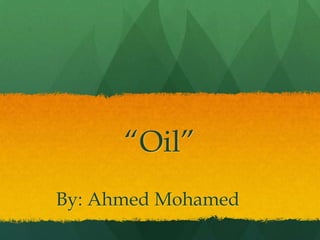
Ahmed oil
- 2. Agenda What Is Oil? How Do We Get Oil? Turning Oil into Fuel: The Distillation Process Oil Spills, potential reasons
- 3. Oil Fossil Animals and plants from millions of years ago. What Is Oil?: •Oil is the substance that comes out of the ground. •It is also known as petroleum which is a non-renewable resource. •Crude oil is a fossil fuel, meaning that ancient plants and animals that died millions of years ago had decomposed naturally to fossils.
- 4. Oil Oil Tube Oil Layer Sharp Driller Oil Rig How Do We Get Oil?: Oil is underground and people have to use an oil rig to drill thick rocks until it reaches the oil layer. They use mechanic sharpened teeth driller to drill underground. When they finish drilling to the oil layer, they get a tube to suck the oil from underground.
- 5. Oil Turning Oil into Fuel: The Distillation Process •Crude oil is placed into a distillation column in order to separate the substance into new elements. •Crude oil is heated up and, depending on the temperature, produces different products.
- 6. Oil The Distillation End-Products Light Middle Heavy distillates distillate distillates Others •Liquid petroleum gas •Automotive •Petrochemical (LPG) •Heavy fuel •Asphalt and railroad •Gasoline oils •Petroleum diesel fuels (known as •Bunker fuel • coke petrol) •Residential oil and other •Lubricating •Kerosene heating fuel residual fuel oils •Jet fuel and •Other light oils •Waxes and other aircraft fuel oils fuel greases
- 7. Oil How Oil Spills Happen Usually, oil spills happen after an accident: 1. A truck full of oil may tip over and spill oil on a highway and the ground next to the highway. 2. A ship carrying crude oil may be caught in a storm or strike a reef, tearing open its oil tanks. 3. A pipe carrying crude oil through a wilderness or underwater may burst. In all these cases, the spill is the result of an accident. •The most difficult place to clean up an oil spill is on the ocean, but not all oil spills happen at sea; some happen on land. •Both kinds can kill animals and poison water, and clean-up is expensive. • Technology offers some means of controlling spills after they happen, but oil spills cause environmental damage before they are contained.
- 9. Q&A